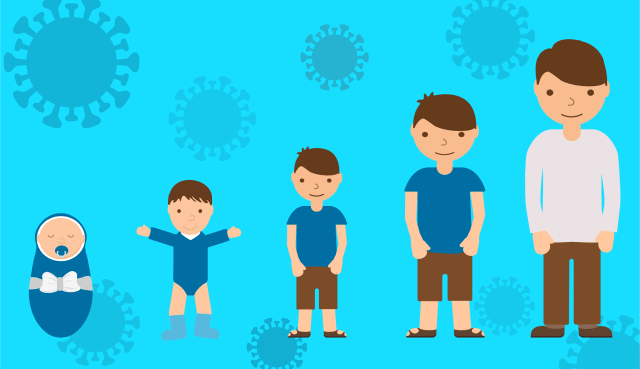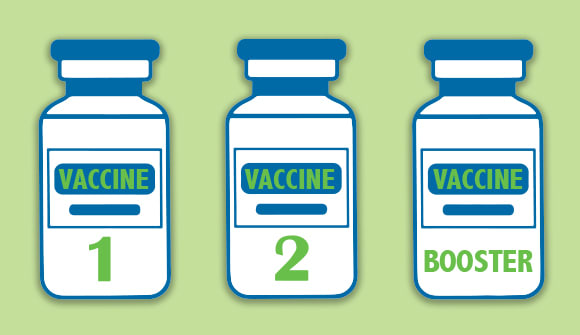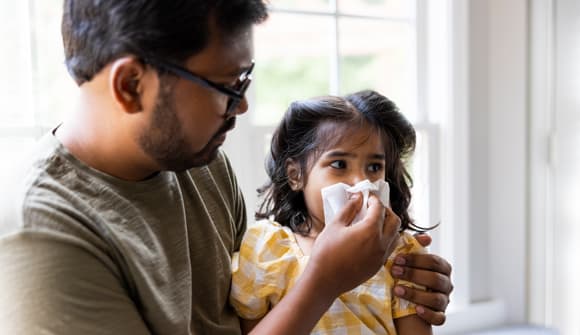Long COVID-19 in kids
Expert answers top questions about lingering symptoms in children.
Article Date:

With new cases of COVID-19 rising in children, including those who are not yet old enough to receive a vaccine, medical experts are growing more concerned about the virus’ long-term complications for babies, kids and teens.
Mobeen Rathore, MD, chief of pediatric infectious disease and immunology at Wolfson Children’s Hospital, answered questions about the phenomenon known as "long COVID" that is now being reported in children, as well as in adults.
What is long COVID?
Long COVID is a term referring to neurological, physical or psychiatric symptoms that linger for weeks or months after an initial COVID-19 infection. The symptoms and duration, as well as severity, seem to vary.
“Long COVID was first noted in adults, but we are seeing similar symptoms continue in children even after the illness is supposed to have worn off,” said Dr. Rathore. “Since we’re still learning about this prolonged condition, I prefer to use the phrase ‘long-term complications of COVID.’ Though we don’t exactly know the mechanism by which long COVID occurs, we certainly know there are long-lasting effects from this virus.”
Doctors have reported long-term COVID symptoms across all pediatric age groups, from infants to teenagers. Even children who were asymptomatic or had mild cases of COVID-19 may still experience lingering effects.
What are symptoms of long COVID in kids?
The most common long-term symptoms in children include:
- Anxiety
- Brain fog (trouble concentrating or thinking)
- Depression
- Fatigue
- Headache
- Heart palpitations
- Insomnia
- Loss of taste and/or smell
- Muscle pain
- Trouble breathing
“It’s important to note that younger children might not know how to describe some of the symptoms they’re experiencing,” said Dr. Rathore. “For example, they might not know what brain fog is or how to describe it. Because of this, I think we’ll see different definitions of long-term symptoms for various age groups in the future.”
What should parents do if they suspect their child has long COVID?
“First and foremost, parents should always consult their child’s pediatrician,” said Dr. Rathore. “We’re still learning about long-term complications of COVID. Some of these symptoms, like anxiety or depression, could be caused by other pandemic-related issues, such as school closures, social isolation or trauma from seeing family members sick. Children who were hospitalized due to a severe case of COVID-19 may also experience post-intensive-care syndrome, which can mimic some of the long-term symptoms of COVID being reported.”
Dr. Rathore further explained, “A child’s pediatrician can rule out other conditions or external factors to determine the root of the cause and then guide parents through the best treatment plan. They can also make a referral to a specialist for further evaluation.”
What is the long-term effect on children?
The debilitating and lingering symptoms of COVID-19 have the potential to disrupt children’s schooling, sleep, extracurricular activities and other aspects of life.
“They are in their formative years,” said Dr. Rathore. “And if these symptoms start causing them to fall behind, things can easily turn into a downward spiral.”
Dr. Rathore concluded, “While this is still a poorly understood phenomenon in children and adults, I want to emphasize that children with long-term complications of COVID have many more years left in their lives than older adults with lingering symptoms. Think about your child’s future, not just the present. The most important thing parents can do is get vaccinated themselves and ensure that everyone around their children, especially those who are younger than 12 or immunocompromised, is vaccinated. I also advise them to make sure their children who are of eligible age are vaccinated, too."
At Baptist Health, we want to help keep our community informed about COVID-19. For more information about COVID-19 vaccines visit baptistjax.com/covid19vaccine.



